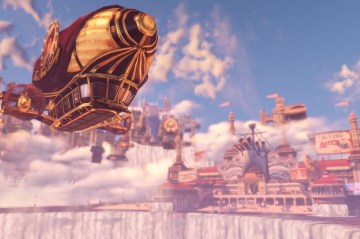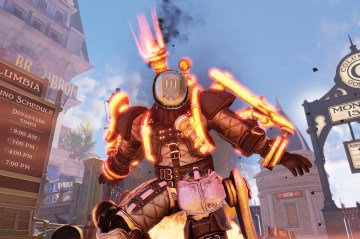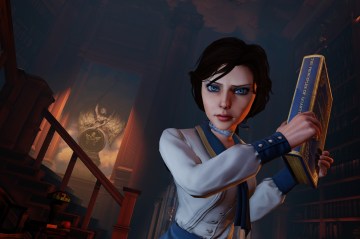Ken Levine is running. No really! I’m assuming on a treadmill. Aha, I think, something we have in common. I’m a runner, too, though as I’m speaking to him by phone, listening to him catch his breath, I feel like I imagine the characters in Kevin Brockmeier’s “The Ceiling” must by the end of that elegiac O. Henry-winning story, my chest compressed as if by galactic forces. I’m sick. Ken, apparently, is healthy as a horse.
Which is good, considering he’s about to release one of the most anticipated video games since, well, the original BioShock. No pressure! Levine is the co-founder and creative director of Irrational Games, where he’s been the guiding hand behind video game milestones like System Shock 2 and the Freedom Force real-time strategy games. Before Irrational, he worked for one of my all-time favorite design houses, Looking Glass Studios, helping craft the watershed stealth PC game Thief: The Dark Project.
Nowadays he’s under intense scrutiny from BioShock wonks, following up one of the highest-rated games of all time (he wasn’t directly involved in the official sequel, BioShock 2) with BioShock Infinite: a thematically linked first-person shooter that trades BioShock‘s deep-down-below for the way-up-high, and Rapture’s mid-1950s art deco objectivism-forged claustrophobia for a floating American sky-city dubbed Columbia circa 1912 — a city riddled with fascism, racism and religious zealotry. The new game lands next Tuesday.
I tap Google Voice’s record button and we’re off. (This is part one of a two-part interview — part two is here.)
How are you doing? It’s been what, seven years since I saw you, before the first BioShock came out?
Yeah, it’s been a busy few years. We’re ready to give this game to people and see their reactions because that’s when it gets really interesting, you know, getting out in the world. You live with it, you build it, you fall in love with it, then at some point it’s time to cut the cord and let it go.
When you look back at the original game and you think about how overwhelmingly positive the reaction was to it, what do you see about it with 2013 eyes, where you might say “That was a compromise,” or “We could have done that better”?
You always have to make decisions and compromises. Your constraints are defined by the team and the time and the platform, and then of course your ability and imagination. So I think that given infinite time you could always do more. I don’t think there’s anything in particular that when we released the game, we were like, “Okay, I really wish we had this.” There were small things, like we had dual-wielding with plasmids and vigors, but we put it in so late that we didn’t really have time to test it, so we had to take it out. That was a bit of a compromise, but then they had it in BioShock 2, which was great.
But I think it was the game we intended it to be. Certainly we didn’t compromise on the message we wanted to get across or the themes we dealt with. Looking back, I don’t see any big things that I would have changed. After it came out, with some reflection — you know I’ve talked about this before so it’s not like it’s new — but I think there’s probably some retooling I would have done with the last third of the game. That’s definitely the benefit of hindsight. At the time I wouldn’t have known that.
The reason I ask is that one of the things I found fascinating back in 2006 was when you showed me all those pictures of real people who’d chosen to wear masks to conceal facial war wounds — the inspiration for the design of BioShock‘s splicers. At the time, you were planning to use the way characters in the game world reacted to the player to reflect their choices, you know, taking this drug that gave them supernatural abilities but that also, over time, caused horrible disfiguration. And yet that never made it into the game.
There’s a concept that…you work out things and you have a million ideas as you go along, and sometimes the ideas make the cut and sometimes they don’t. And we always say that, “Well, people don’t know what’s not in the game,” right? So that feature for instance, like, not only do people not know that we were even thinking about it, I completely forgot about it since then, because looking back at it, I don’t think it would have added anything that would have had a huge impact on the story we were trying to tell, which was really less about addiction or anything like that and more about the will to power and people trying to become the best possible version of themselves. I think we represented that pretty well, both in the splicers and the world, and [warning, original BioShock spoiler imminent!] the sense that Jack essentially found out he had no will, that he was a complete cipher. So looking back, I haven’t thought about that particular topic for years. I don’t think it would have made a huge difference in the game.
Sure, and having played and replayed it, even knowing about that idea, it’s hard to see what it would have added, as you say, without shifting other ideas around. I’m just surprised how much the game retains its power going back through it now. There’s so much going on thematically and philosophically.
I think we were probably unprepared that people would dig into that stuff as much as they did. We thought it was our little nerdy junior professor moment, playing around with those themes. If you were to ask me what was I happiest about with the game, it’s how deeply people engage all the themes. We had to make sure the game worked, even if people didn’t engage that deeply, you know, so there was lots to see and cool monsters to fight, but certainly I’d look back on the game very differently if people were like, “Yeah, that was cool. What’s that about free will? What’re you talking about?” So that’s a bonus when you make a game, because you want to make a fun game, but if it can become something that people attach themselves to in ways that have nothing to do with the mechanics of the game, that’s an additional bonus, and for me as a writer on that game, it’s very gratifying.
What do you think about BioShock becoming the unofficial spokes-game for this whole “games as art” movement that really sprang up, for better or worse, in its wake?
It’s not really a topic that ever engaged me particularly. And I think it’s disappointing to people when I tell them that, because I think they want to…sometimes people look at me as if I have something really profound to say about what games are. But you know, look, I have a liberal arts college education. I spent a lot of time in classes and the argument in classes was “What is art?” and this back and forth about what is the meaning of art. Nobody’s ever really established what the meaning of art is. I have my definition, everybody has their own definition. Whatever liberal arts class I was in back in 1985 having that debate, I’m sure every single person in that class had a different definition.
So then it’s very hard to say on top of that, “Okay, now that we don’t have a definition, does this fit into that unknown definition?” For me, what I care about, is does it…caring about things that don’t exist is both the definition of art and insanity. Why care about something that doesn’t exist? And yet people engage emotionally. There is no Indiana Jones. There is no Charles Foster Kane. And yet people engage with these things, and they care about them, even though they actually have no impact. It’s not like a loaf of bread where hey, I’m starving, and I eat a loaf of bread and those bread bits turn into calories and carbohydrates and some proteins, and it makes your body function, or say having shelter for your family when you know a storm is coming. It has no meaning…and yet it does.
So I think that’s the question. Does something have meaning that shouldn’t have meaning? That, to me, is what art is.
I spoke with Shigeru Miyamoto recently and asked him a similar question — he said it’s all still, for him, basically “Is this fun or not?”
Yeah, is it fun? Or does it make you care? That’s the thing, because there’s no output from a game. It comes down to what’s in your head. It’s not like you make a Microsoft Word document and words come out and those words get turned into a bill that gets turned into a law that means you can’t cross the street. You know, games have no output…except what you make of them, of course. I think that’s cool, and I like being in that field, because I think if I was just making crackers all day, that wouldn’t be as satisfying for me, though it’s certainly more nutritious, and you could actually give those crackers to your kid and feed him or her. Crackers are probably more valuable, I guess, but I’d rather make the stuff that has no value.
Sure.
I can see the headline now. “Ken Levine likes to make stuff that has no value.”
Or “Ken Levine Doesn’t Like Nutritious Crackers.”
There you go.
I just started playing the game, and I’m struck, on the one hand, by how wildly different the world looks, but also by how very BioShock it still feels.
When we announced BioShock Infinite I think there were three camps. There was the camp that was like, “Okay, Irrational’s doing a new game, we trust them,” which was probably the minority view. And there was another camp, probably larger, that said “This is calling it BioShock because the marketing guys said you have to, they’re just pulling our legs because they want to make a different game and calling it BioShock will sell more copies.” And the third camp was like, “Oh my god, they’re basically just re-skinning Rapture and they’re going to make exactly the same thing!”
So you get these people reacting in completely opposite ways, and for some reason our games do that to people. They bring out a lot of anxiety before they come out, and I think it’s because people are very personally attached. I can’t tell you how many times I’ve seen people with those chain tattoos on their wrists. That’s a serious commitment. I think people make a serious connection to the game and then they’re nervous that it’s going to somehow become, you know, corporatized and neutered.
But BioShock Infinite was always to me a BioShock game. We just decided that BioShock didn’t mean Rapture exclusively, that it means the look…the sort of hyper-stylized look of the world, the saturation of color, the feeling, the sense of humor, the combat mechanics and the kinds of themes we take on. We deal with the time period and we take the politics, the art, the music, the culture, the science, the advertising, the technology and then we give it a twist — a little bit of science fiction, whether its plasmids or buildings that float and tears that open in space — and we sort of put that all on a pod. I think that makes BioShock Infinite very much a BioShock game. I think as people play it, they’re going to learn more and more how it’s a BioShock game.
Some of my favorite moments in a game occur in BioShock, but before that, too, really going back to both System Shock and System Shock 2, where you’re self-modifying and exploring, and sort of navigating survival horror informed by science fiction encapsulated in these dark, socio-political themes. There’s a sense of what makes a “Shock” games going all the way back, isn’t there?
That’s a great question. I’ve thought a lot about that, and I think there’s a bunch of stuff that defines the “Shock” experience. I’ve really dug deep on this lately, because you finish a game, and you’re like, “What is the mission of the company?” you know, “What’s been the mission since we started?” And I don’t think we even knew what it was in the beginning. We started with this game that combined roleplaying and shooting and a cool sense of environment and interaction with characters like SHODAN. As rough as it was, for the time, you were having a relatively sophisticated relationship with a character in a game that wasn’t just based in cutscenes. She chastised you, she punished you, she got mad at you, she threatened you… [System Shock 2 spoilers ahead!] I don’t know if you remember the part where you’re about to go into this room where Delacroix’s body was, and SHODAN didn’t want you to go in because she knew you’d find out that she betrayed her former avatar, and she said “If you go in there I’m going to punish you,” and she did if you went in there, and she rewarded you if you didn’t and followed her directions. That was a very rudimentary form of relationship.
With BioShock, things like the Big Daddy and Little Sister, I think it’s fair to say — and I’m not trying to self-aggrandize here — that they’ve become somewhat iconic characters in gaming. I think the reason that is, is not because of their combat capacity or their weapons, though I think it’s cool to have a drill shoved in your face and everything. But imagine the game without the Big Daddy or Little Sister. Imagine the game with just the Big Daddy walking around attacking you. I think it was their relationship and interaction, that you felt some empathy with them, that you connected to their relationship. That’s why I love…I see all these pictures of fathers and daughter cosplaying the Big Daddy and Little Sister together. I think that’s a great thing to see, because it shows that people are connecting on that level.
With BioShock Infinite, I think the inheritor of that sort of tradition of bringing the player into a connection with characters and therefore making them part of the narrative rather than observers is…the final state of where we are now is your relationship with Elizabeth. I don’t know how far you’ve gotten in the game, but all the work we’ve done to build this character, to make her interactive, not just in cutscenes, but to make her live in the space all the time, to make her your partner, to make the story centered around your relationship with her, is to me the next step of “How do you bring the player into a narrative?” Generally, you do that through characters and how you make players not an observer, because that’s what most games do, right? They have some gameplay, then you have some cutscene and they give you some narrative, and then you go back to the gameplay, then back to the narrative and so forth. We’ve always tried to combine the two. It’s just been hard, because making characters is the tough part. With each game we try to move the needle a little bit forward.




